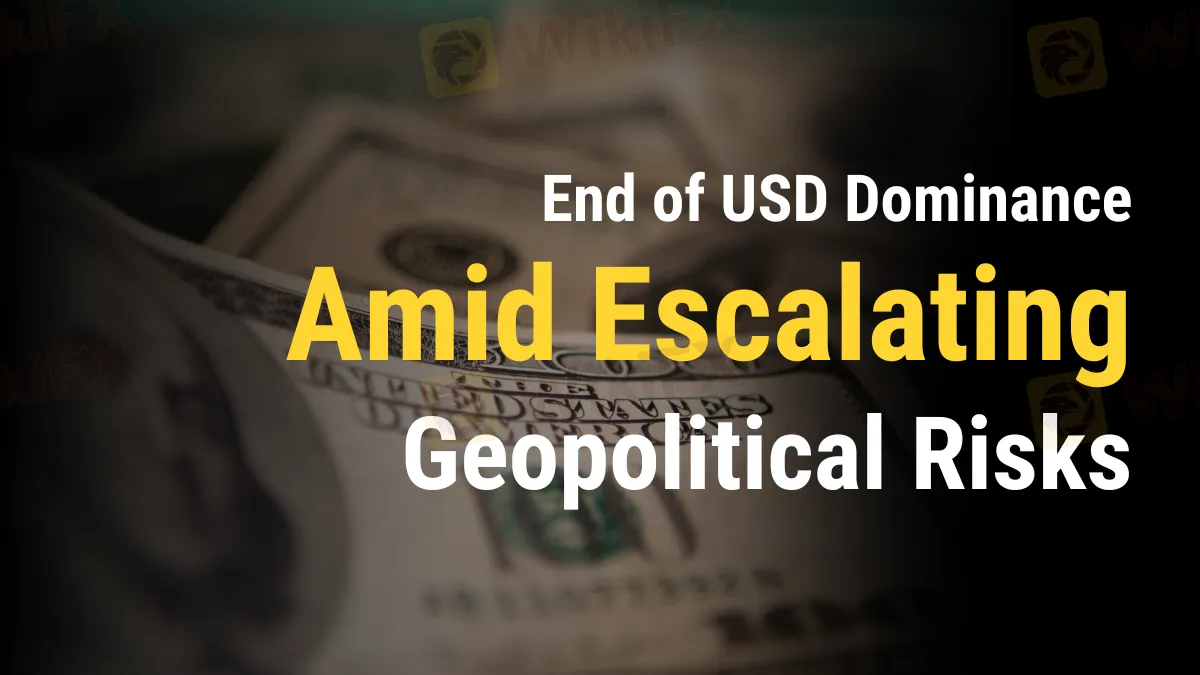简体中文
繁體中文
English
Pусский
日本語
ภาษาไทย
Tiếng Việt
Bahasa Indonesia
Español
हिन्दी
Filippiiniläinen
Français
Deutsch
Português
Türkçe
한국어
العربية
End of USD Dominance Amid Escalating Geopolitical Risks
Abstract:After Israel's retaliation, currency markets face volatility, reflecting geopolitical tensions and influencing global currency forecasts.

After Israel's retaliatory assaults on Iran, currency markets have seen heightened volatility, suggesting a potential shift in the dominant role of the US dollar.
According to recent data from the Philly Fed manufacturing survey, there was an early increase in confidence in the US currency. This aligns with the Federal Reserve's prudent monetary policy approach.
However, concerns arise over the long-term sustainability of this advancement, considering the escalating global conflicts. The 2% increase in crude oil prices highlights the market's susceptibility to geopolitical events, adding complexity to currency forecasts.
Positive and negative economic outcomes were observed in the United States before the geopolitical escalation, with concerns regarding the repercussions of a strong dollar contributing to this balance. The IMF's cautions over divergence, namely regarding significant fiscal deficits in the US relative to other advanced countries, have intensified market examination. Although the dollar demonstrates resilience against specific currencies, market sentiment suggests that this discrepancy may be subject to limitations.

Due to the disparity in interest rates between the European Union and the United States, in addition to cautious statements by ECB officials, currency forecasts have become more complicated. Subsequently, the Japanese yen initially appreciated following the reaction from Israel, indicating a more widespread avoidance of risk. However, upon closer inspection of the data from Japan, a more nuanced picture emerges due to the unexpectedly low Consumer Price Index (CPI) readings, which raise concerns about the potential presence of inflationary behaviors.
The complicated balance in global foreign exchange discussions is evident since Washington expresses no significant worry over the declining value of the yen. The correlation between geopolitical events and currency markets underscores the need for flexible policies and approaches. While an initial aversion to risk may exist, policy measures and broader economic fundamentals will ultimately determine the course of currency fluctuations.
In the current period of instability, investors must possess an all-encompassing understanding of global dynamics to identify potential opportunities amidst uncertainty.

Disclaimer:
The views in this article only represent the author's personal views, and do not constitute investment advice on this platform. This platform does not guarantee the accuracy, completeness and timeliness of the information in the article, and will not be liable for any loss caused by the use of or reliance on the information in the article.
Read more

The Hidden Checklist: Five Unconventional Steps to Vet Your Broker
Forex broker scams continue to evolve, employing new tactics to appear credible and mislead unsuspecting traders. Identifying these fraudulent schemes requires vigilance and strategies beyond the usual advice. Here are five effective methods to help traders assess the legitimacy of a forex broker and avoid potential pitfalls.

Doo Financial Obtains Licenses in BVI and Cayman Islands
Doo Financial, a subsidiary of Singapore-based Doo Group, has expanded its regulatory footprint by securing new offshore licenses from the British Virgin Islands Financial Services Commission (BVI FSC) and the Cayman Islands Monetary Authority (CIMA).

CFI’s New Initiative Aims to Promote Transparency in Trading
A new programme has been launched by CFI to address the growing need for transparency and awareness in online trading. Named “Trading Transparency+: Empowering Awareness and Clarity in Trading,” the initiative seeks to combat misinformation and equip individuals with resources to evaluate whether trading aligns with their financial goals and circumstances.

Malaysian-Thai Fraud Syndicate Dismantled, Millions in Losses Reported
The Royal Malaysia Police (PDRM) has received 26 reports concerning the Nicshare and CommonApps investment schemes, both linked to a major fraudulent syndicate led by a Malaysian citizen. The syndicate’s activities came to light following the arrest of its leader by Thai authorities on 16 December.
WikiFX Broker
Latest News
AIMS Broker Review
The Hidden Checklist: Five Unconventional Steps to Vet Your Broker
Russia to Fully Ban Crypto Mining in 10 Regions Starting January 1, 2025
YAMARKETS' Jingle Bells Christmas Offer!
Why is there so much exposure against PrimeX Capital?
MTrading’s 2025 "Welcome Bonus" is Here
Doo Financial Obtains Licenses in BVI and Cayman Islands
CFI’s New Initiative Aims to Promote Transparency in Trading
Currency Calculator



